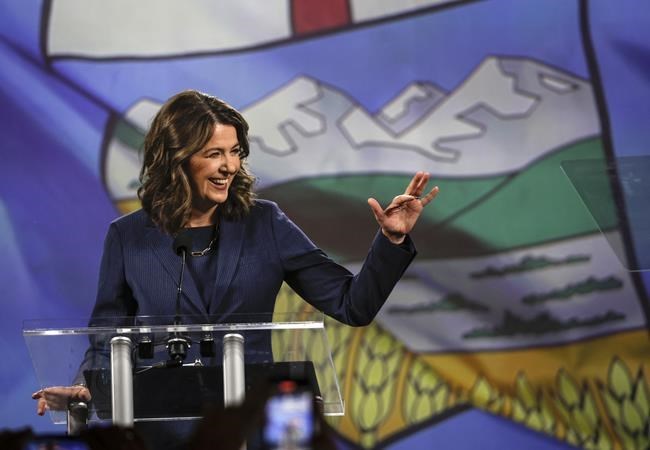OTTAWA — Danielle Smith's electoral victory in Alberta could spell the beginnings of a renewed confrontation between her province and Ottawa over climate policy — and create fodder for future attacks against the federal Tories, political observers say.
The United Conservative Party leader's majority win over Rachel Notley's NDP in Monday's provincial vote put an unsurprising spring in the step of Conservative MPs from Alberta, long known as the country's conservative heartland.
That assumption was tested during the campaign, which was voters' first chance to weigh in on Smith's government since she took the helm of the party and the legislature last fall.
It was an initial victory spurred by the support of people who were aggrieved by the COVID-19 mask and vaccine mandates under her predecessor, Jason Kenney.
"The focus is that we won," said Calgary MP Stephanie Kusie, who represents a federal riding Kenney held when he was a cabinet minister in Stephen Harper's government.
"Less than a year ago, we had a new leader of the UCP that even I myself was unsure would go on to be successful. But she has been."
That sentiment has been a familiar refrain from conservatives both inside and outside of the province, with skeptics pointing out her comments about the pandemic and her government's passage of a law that seeks to give the Alberta legislature the power to step around federal measures it opposes.
Smith used her victory speech to call out Prime Minister Justin Trudeau and the federal Liberals. She asked Albertans "to stand shoulder to shoulder against soon-to-be announced Ottawa policies" regardless of how they voted.
In addition to federal firearms policies, Smith has taken specific aim at the Liberals' climate agenda, from carbon pricing to measures aimed at reducing emissions from the oil and gas industry. She argues such policies hurt Alberta's economy.
Speaking to reporters in Ottawa, Trudeau congratulated Smith on her victory and said he planned to speak with her Tuesday afternoon.
Natural Resources Minister Jonathan Wilkinson also struck an optimistic tone about the hope of finding common ground on priorities such as the development of hydrogen and mining of critical minerals.
"Canada works best when Canadians work together," he told reporters Tuesday. "I'm going to approach the conversations with Premier Smith and her new cabinet with an open mind."
Environment Minister Steven Guilbeault agreed, saying the federal government will continue working with the province as it has over the past few years.
But Garry Keller, who served as a chief of staff to former Conservative interim leader Rona Ambrose, said that with Smith back in the premier's office, she and the Liberals are on a collision course over climate.
He suggested that's a fight that both Trudeau and Smith likely want to have. But he questioned whether Poilievre would want to step into that ring.
"Maybe he does, but he probably wants to be talking about something other than climate, because … he'll have to put something in the window in terms of climate policy," said Keller.
"For Conservatives, climate (and) environment are always shield issues, not sword issues. And so, the less you're talking about climate, environment, the more you're talking about jobs, economy, Liberal scandals — the better for Pierre Poilievre and the federal Conservatives."
Poilievre, who endorsed Smith in the final stretch of the campaign — asking people to "vote Conservative"— said on Twitter after her win that Alberta voters have "rejected the woke NDP-Liberal coalition," including its consumer carbon price.
Harper also threw his support behind Smith when many observers wondered whether moderate conservatives would turn up at the polls, given her controversial comments.
Carlene Variyan, an associate vice-president at Summa Strategies and a former senior staffer in several Liberal ministers' offices, suggested that having Smith in the premier's office is unhelpful to Poilievre's goals.
The federal leader and his front-bench MPs have been looking to grow their support in and around Metro Vancouver, the Greater Toronto Area and southwestern Ontario — regions that could be key to a Conservative victory.
The biggest challenge for Smith in Monday's election was winning support in urban Calgary and Edmonton ridings.
Anytime Smith says or does anything that appears extreme or offside with public opinion will provide an opening for conservative opponents, Variyan said.
"It provides the Liberals with a lot of easy material to put Poilievre in a bind."
Though some watchers looked to draw lessons from the win in Alberta, Conservative MP Greg McLean, who represents a riding in Calgary, emphasized that these are two different political parties.
And for Dane Lloyd, another Conservative MP from Alberta, the big takeaway was to not take anything for granted. It's a mentality that Poilievre's team adopted during his meteoric rise to leadership last year.
"We have to keep putting forward a vision that the people of Alberta and the people of Canada can get behind. And I think if we put forward that vision that the people want to see, it will be reflected in the voting results."
As the Liberals now face another four years of working with a premier who has been more foe than friend, Deputy Prime Minister Chrystia Freeland, who herself hails from Alberta, said the Liberal government respects Albertans' choice.
"The people of Alberta have voted and we recognize that."
This report by The Canadian Press was first published May 30, 2023.
Stephanie Taylor and Mia Rabson, The Canadian Press




